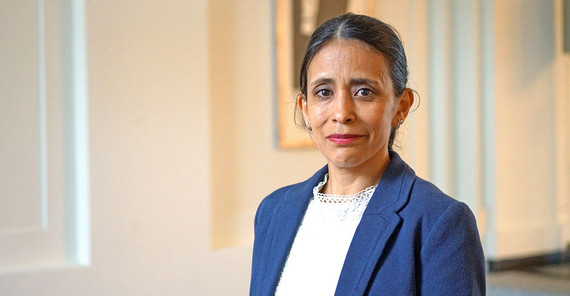The 44-year-old has been the new Integration Commissioner of the state of Brandenburg since May 2024. It is a decision that the petite but always energetic woman did not make without her family. The former employee of the University of Potsdam will now be traveling around the state more often, including on weekends. And she will need a lot of support to take a clear stand against racism. She has enough political experience for this difficult office: She spent ten years as a volunteer on the state capital’s migrant advisory board, for a while as its chairwoman, while she advised students from abroad in her regular occupation and coordinated the Refugee Teachers Program at the University of Potsdam.
A village demonstrates how integration can succeed
The social scientist from Mexico believes that well-informed discussions about societal concerns and needs are more necessary than ever, especially in these crisis-ridden times. This is one of the reasons why she has come to Groß Schönebeck this Sunday. The village of 1,800 inhabitants in the Schorfheide region exemplifies successful integration when the community acts in unison and opens up at the same time. In 2015, when people from Syria, Pakistan, Chechnya, and later Ukraine arrived here, the Groß Schönebeck Citizens’ Association first focused on housing, furniture, and clothing, and then on employment and apprenticeships. Volunteers organized language courses and provided bicycles. The children were admitted to daycare centers, schools, and sports clubs. People meet in the welcome café, while growing vegetables in the community garden, or in the parish’s One World Shop.
According to association chairman Rainer Klemke, a clear concept and effective communication are essential for success. This was emphasized during a tour of the village where many locals, including refugees, participated in the dialogue facilitated by Diana Gonzalez Olivo. In Groß Schönebeck, similar to other communities, a quarter of the population supports the AfD; however, the village has not experienced any xenophobic insults or racist attacks.
With patience and stamina
The municipality, which received the Brandenburg Integration Award for its commitment, is now sharing its best practices in the recently launched “Move, Brandenburg!” campaign. “While others are calling for exclusion and isolation, we want to focus on courage and optimism,” she says. The idea for this state-wide initiative came from her predecessor in office, Dr. Doris Lemmermeier, who also came to Groß Schönebeck. Diana Gonzalez Olivo is happy to have her at her side. “We want everyone in Brandenburg to be able to lead a good life, regardless of whether they are immigrants, refugees, have been here for a long time, or have always been here.” With this basic understanding, she wants to advise the state government on all migration policy matters.
Her office is not limited to the duration of an electoral term. This gives her the opportunity to make sustainable changes. She has the stamina to do this as well as the necessary determination. She has proven this at the university. When the first nationwide qualification program for refugee teachers was launched here in 2015, a pile of applications had to be processed virtually overnight: Hundreds of inquiries, to which there was not always an immediate response. But the native Mexican, who knows from her own experience how difficult it is to find your way in a foreign country, didn’t give up. She researched, consulted authorities, and looked for solutions. It was all the more disappointing to see the obstacles that arose when it came to getting the graduates into the teaching profession. She and her colleagues at the university published a book on how refugees and migrant teachers can successfully start their careers in Germany. “Recognizing qualifications and integrating skilled migrants into the labor market has to happen much faster,” she says and announces that she will set clear priorities here. Another priority will be education, which she regards as essential for successful integration.
When the German studies graduate came to Germany in 2008, she had the opportunity to pursue a master’s degree at the Brandenburg University of Technology (BTU) in Cottbus, opening up new career paths for her. Now, she is Brandenburg’s first Integration Commissioner with a migration background. This strengthens her position. It helps her empower others.
Diana Gonzalez Olivo was a research assistant at the University of Potsdam and has been Integration Commissioner of the state of Brandenburg since 2024.
This text (in german language) was published in the university magazine Portal - Zwei 2024 „Europa“ (PDF).

